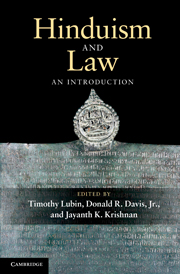Book contents
- Frontmatter
- Contents
- List of contributors
- Acknowledgements
- Chronology
- Abbreviations
- Map South Asia: political divisions c. 1860 and today
- Introduction
- Part I Hindu law
- Chapter 1 A historical overview of Hindu law
- Chapter 2 Dharmaśāstra
- Chapter 3 The practice of classical Hindu law
- Chapter 4 The creation of Anglo-Hindu law
- Chapter 5 Marriage and family in colonial Hindu law
- Chapter 6 Hindu law as personal law
- Part II Law in ancient and medieval Hindu traditions
- Part III Law and modern Hinduism
- Glossary
- Bibliography
- Index
Chapter 1 - A historical overview of Hindu law
Published online by Cambridge University Press: 05 June 2012
- Frontmatter
- Contents
- List of contributors
- Acknowledgements
- Chronology
- Abbreviations
- Map South Asia: political divisions c. 1860 and today
- Introduction
- Part I Hindu law
- Chapter 1 A historical overview of Hindu law
- Chapter 2 Dharmaśāstra
- Chapter 3 The practice of classical Hindu law
- Chapter 4 The creation of Anglo-Hindu law
- Chapter 5 Marriage and family in colonial Hindu law
- Chapter 6 Hindu law as personal law
- Part II Law in ancient and medieval Hindu traditions
- Part III Law and modern Hinduism
- Glossary
- Bibliography
- Index
Summary
Hindu law has always existed within a broader pluralism of legal systems in India that to a greater or lesser extent overlapped with one another in both form and substance. Distinguishing the specifically Hindu element in the larger history of law in India is difficult because of the notoriously poor record of premodern legal practice. Still, the history of Hindu law is part of the history of law in India and by describing the latter we necessarily comment upon the former as well. I define classical Hindu law as “a variegated grouping of local legal systems that had different rules and procedures of law but that were united by a common jurisprudence or legal theory represented by Dharmaśāstra” (D. R. Davis 2008: 225). Thus, while I consider Dharmaśāstra, Sanskrit texts dealing with religious and legal duties, to be the distinctively Hindu element in Hindu law throughout its history, I am not concerned in this overview with its jurisprudence. Rather, I want to provide a skeletal history of legal practice in India that heuristically avoids Dharmaśāstra by limiting, somewhat artificially, references to the scholastic tradition to instances of the texts pointing beyond themselves. The major factors I want to consider instead are broader historical trends and how these impacted the practice of law in India and, thus, also among Hindu communities. Because of the nature of the evidence, the history I give is more a hypothesis than a documented synthesis.
The principal legal actors or institutions that recur in the historical record of law in early India are corporate groups, rulers, and, later, temples. The practice of law revolved around these three social agents. To place these agents in historical context, however, necessitates choosing a datable point from which to begin a description of the legal history of Hindu law. Several recent works have focused on the “between the empires” (Olivelle 2006a) period between the second century bce and the second century ce as the formative era during which significant innovations in the social and political life of India occurred, including the political and financial solidification of the Buddhist monastic community; the early epigraphical and archeological evidence of maritime trade; the composition of culturally foundational Indic texts such as the Rāmāyaṇa and Mahābhārata epics, and the Laws of Manu, and, perhaps most importantly, the creation of a nonliturgical, literary use of Sanskrit and its close connection to the articulation of a cosmopolitan rulership (S. Pollock 2006).
- Type
- Chapter
- Information
- Hinduism and LawAn Introduction, pp. 17 - 27Publisher: Cambridge University PressPrint publication year: 2010
- 4
- Cited by



